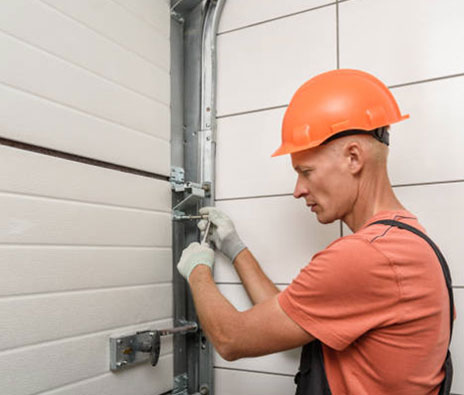Updated: December 2nd, 2024
Do you know that your parking space is an important aspect of your home’s security and safety? It symbolizes functionality, comfort, and safety.
The garage is a safe place where everyone keeps their valuable junk and exotic vehicles. When it stops opening or working correctly, it can become inconvenient and frustrating.
Just like how your cars and properties need frequent maintenance, your garage door also needs one. Over a year, your yard door constantly goes up and down, and this constant movement leads to wear and tear.
However, you can repair your faulty yard door. Not only does a functioning garage door elevate your home’s curb appeal, but it also safeguards your belongings.
Prompt repairs and steady maintenance are vital to guarantee your yard door works safely and smoothly. If your door is faulty or suddenly stopped working, this blog post will enlighten you on common garage problems and repairs.
Common Garage Gate Problems and Repairs
A sudden stop, loud screech, or slow movement when using your garage gate are little disturbances, but these disturbances can interrupt your day-to-day activity and raise questions about your yard door’s reliability.
A working yard gate is a necessity for your family’s safety. Still, just as with most mechanical structures, your gate can face diverse issues that may hinder its smooth operation.
Garage gate issues are a common headache for many homeowners, as they can take a toll on their money and time. Let’s focus on a few garage gate problems and their fixes.
1. Noisy Operation
Noisy rattling, grinding, or screeching of your yard gate can disturb the quietness and peace of your home. When you hear these sounds, it indicates problems with your gate’s mechanism.
A noisy yard gate is more than just a nuisance; it also serves as a cautionary sign of lack of maintenance and wear. The primary causes behind any noisy door are damaged hinges, worn-out rollers, or insufficient lubrication; these guide the door along the rails/tracks.
Also, vibration during yard gate movement loosens nuts, bolts, and several hardware parts, resulting in loud noises or clicking.
How to Fix
Lubricate the moving parts of your yard gate regularly with quality lubricant. Ensure that the rollers, hinges, and springs are lubricated to eliminate noise during use and minimize friction.
Also, make sure to check and tighten all the nuts, bolts, and screws that are along hinges, rails, and other hardware parts.
Ensure to replace worn-out or damaged rollers. When buying new rollers, ensure to choose one with premium quality. For example, nylon rollers are known to generate less noise when compared to plastic or metal rollers.
While DIY fixing goes a long way, you might sometimes need professional assistance. Companies like All Days Garage Doors provide expert repair assistance. With the right support, you can easily get rid of yard gate vibration and weird noises and prolong your garage gate’s lifespan.
2. Slow Response to Keypad or Remote Commands
Old keypad batteries and constant use of the yard gate’s remote control can cause the signal to fail or decrease; it leads to unresponsiveness or delays. Worn-out or damaged wiring, faulty control units, or loose connections in your garage’s door opener system lead to inconsistent or delayed responses.
How to Fix
For smooth operation, replace the keypad batteries or remote control regularly. Also, identify and remove any source of signal interference in your garage, including electronic devices or objects blocking the path and signal.
Carefully examine the connections and wiring of your garage door opener. Watch out for loose connections and signs of wear or damage and repair accordingly. You can hire a professional to inspect and fix faulty electrical components.

3. Inability to Close Completely
A yard gate that refuses to close completely can be upsetting and frustrating as it leaves your home open to security risks and outside factors. Some of its causes include:
Limit Settings on the Yard Gate Opener: This includes limits that define your yard gate and the open & closed positions.
Misaligned Safety Sensors: Many yard gates have safety sensors that stop them from closing if they detect an obstacle on the road or in the door.
Worn-Out or Damaged Parts: Damaged/worn rollers or faulty hinges can affect your yard gate and its smooth operation.
Obstacles in the Yard Gates Trail: Debris, small or large objects blocking your yard door and its trail/path might prevent it from closing and can activate safety sensors.
How to Fix
Clean any debris or dirt blocking the security sensor and align it accordingly. Ensure the sensors close to the bottom of the yard gate are clean, free of obstructions, and well aligned. Also, refer to your garage’s door opener manual and adjust the limits. You may also like to visit Wikipedia to learn more about garage door opener manuals.
But, before you troubleshoot the garage door opener, check the power source to see if it’s functioning correctly. If it still malfunctions, the issue might lie with internal components or the opener motor. If you’re unsure how to fix this problem, seek expert help. They have the knowledge and skill to diagnose and safely repair any issues with security faulty/damaged components, limiters, and security sensors.
Over to You
Your garage door is more than just an entryway; it’s a vital part of your home’s security and convenience. Addressing common issues like noisy operations, delayed responses, or incomplete closures can prevent bigger problems and keep your door functioning smoothly for years to come.
By staying proactive with repairs and maintenance, you not only extend the life of your garage door but also ensure the safety of your belongings and loved ones.
If you found this guide helpful, please share it with others who might benefit from these tips. A little knowledge can go a long way in saving time, money, and effort!






